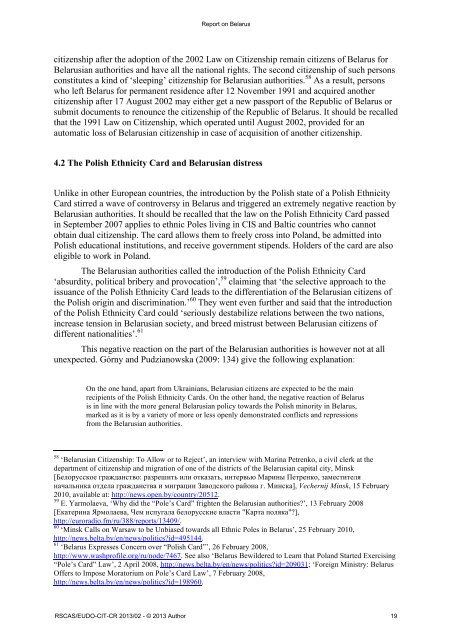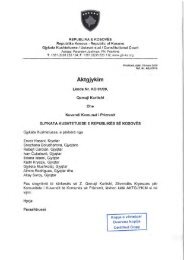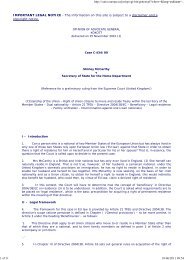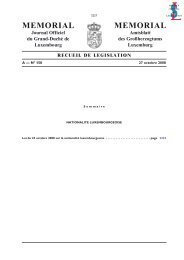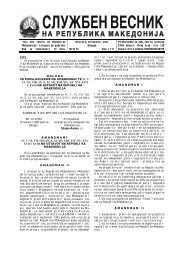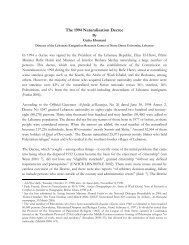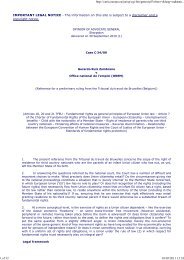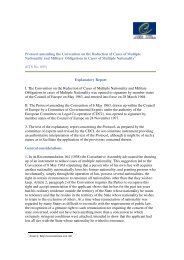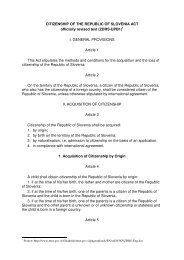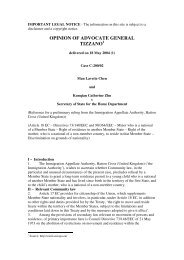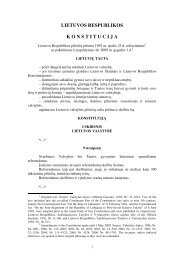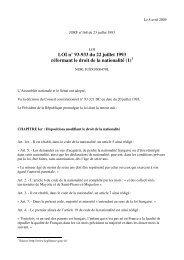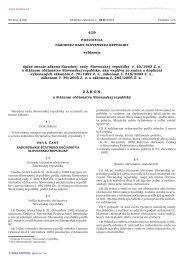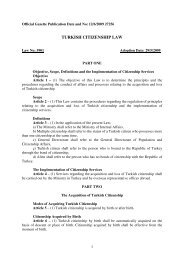Belarus updated November 2012 - EUDO Citizenship
Belarus updated November 2012 - EUDO Citizenship
Belarus updated November 2012 - EUDO Citizenship
You also want an ePaper? Increase the reach of your titles
YUMPU automatically turns print PDFs into web optimized ePapers that Google loves.
citizenship after the adoption of the 2002 Law on <strong>Citizenship</strong> remain citizens of <strong>Belarus</strong> for<strong>Belarus</strong>ian authorities and have all the national rights. The second citizenship of such personsconstitutes a kind of ‘sleeping’ citizenship for <strong>Belarus</strong>ian authorities. 58 As a result, personswho left <strong>Belarus</strong> for permanent residence after 12 <strong>November</strong> 1991 and acquired anothercitizenship after 17 August 2002 may either get a new passport of the Republic of <strong>Belarus</strong> orsubmit documents to renounce the citizenship of the Republic of <strong>Belarus</strong>. It should be recalledthat the 1991 Law on <strong>Citizenship</strong>, which operated until August 2002, provided for anautomatic loss of <strong>Belarus</strong>ian citizenship in case of acquisition of another citizenship.4.2 The Polish Ethnicity Card and <strong>Belarus</strong>ian distressUnlike in other European countries, the introduction by the Polish state of a Polish EthnicityCard stirred a wave of controversy in <strong>Belarus</strong> and triggered an extremely negative reaction by<strong>Belarus</strong>ian authorities. It should be recalled that the law on the Polish Ethnicity Card passedin September 2007 applies to ethnic Poles living in CIS and Baltic countries who cannotobtain dual citizenship. The card allows them to freely cross into Poland, be admitted intoPolish educational institutions, and receive government stipends. Holders of the card are alsoeligible to work in Poland.The <strong>Belarus</strong>ian authorities called the introduction of the Polish Ethnicity Card‘absurdity, political bribery and provocation’, 59 claiming that ‘the selective approach to theissuance of the Polish Ethnicity Card leads to the differentiation of the <strong>Belarus</strong>ian citizens ofthe Polish origin and discrimination.’ 60 They went even further and said that the introductionof the Polish Ethnicity Card could ‘seriously destabilize relations between the two nations,increase tension in <strong>Belarus</strong>ian society, and breed mistrust between <strong>Belarus</strong>ian citizens ofdifferent nationalities’. 61This negative reaction on the part of the <strong>Belarus</strong>ian authorities is however not at allunexpected. Górny and Pudzianowska (2009: 134) give the following explanation:!On the one hand, apart from Ukrainians, <strong>Belarus</strong>ian citizens are expected to be the mainrecipients of the Polish Ethnicity Cards. On the other hand, the negative reaction of <strong>Belarus</strong>is in line with the more general <strong>Belarus</strong>ian policy towards the Polish minority in <strong>Belarus</strong>,marked as it is by a variety of more or less openly demonstrated conflicts and repressionsfrom the <strong>Belarus</strong>ian authorities.!!!!!!!!!!!!!!!!!!!!!!!!!!!!!!!!!!!!!!!!!!!!!!!!!!!!!!!!!!!!58 ‘<strong>Belarus</strong>ian <strong>Citizenship</strong>: To Allow or to Reject’, an interview with Marina Petrenko, a civil clerk at thedepartment of citizenship and migration of one of the districts of the <strong>Belarus</strong>ian capital city, Minsk[6'1.%#44-.' :%,;0,"4


